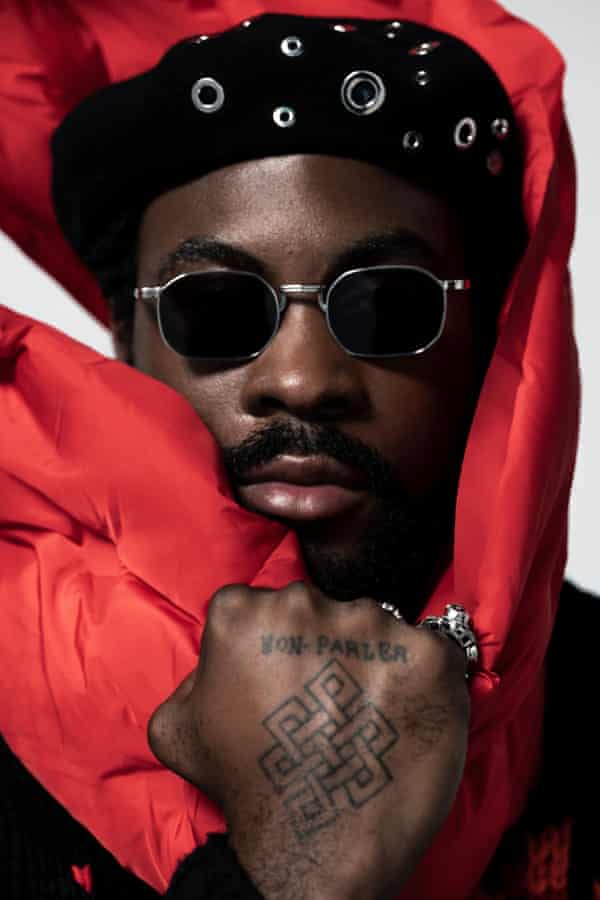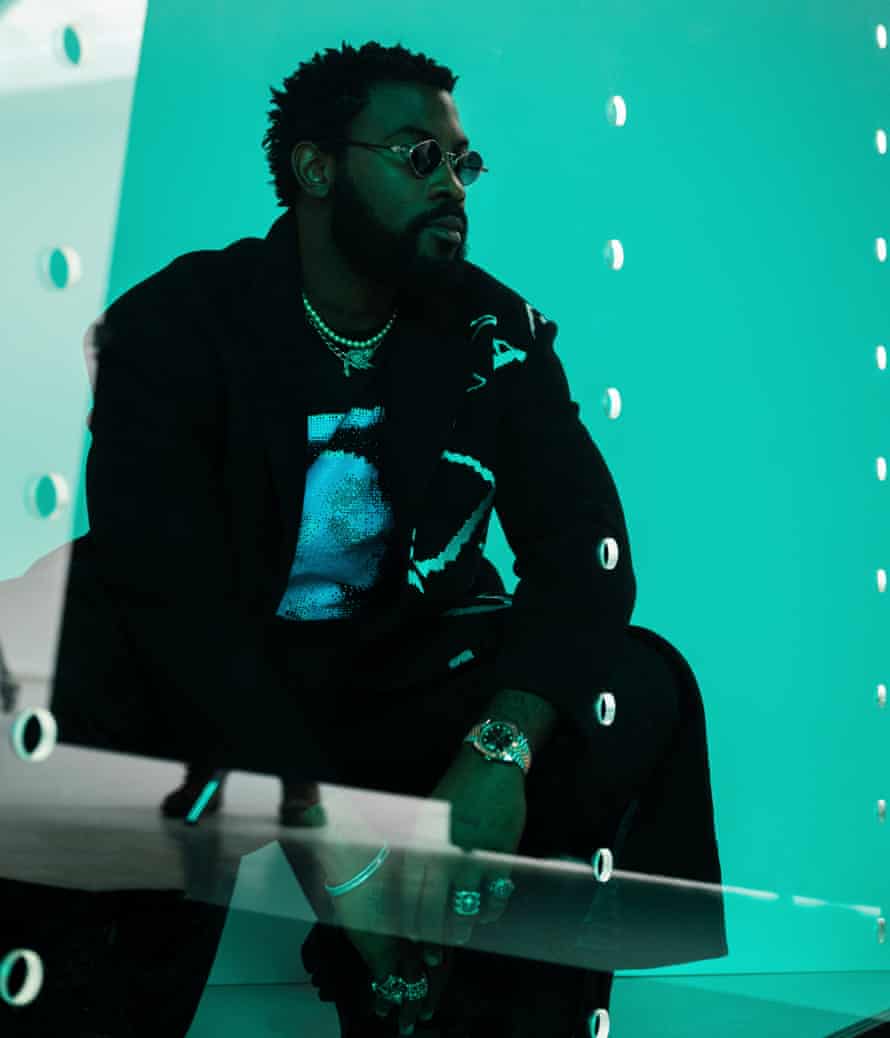‘The questions that I ask myself about death aren’t about dying, they’re about death in this life.” Damso doesn’t really do small talk. Engaging and magnetic even through a computer screen, the 28-year-old Congolese-Belgian rapper is sporting a flamboyant shirt and a considerable amount of jewellery as he ponders the nature of existence. “There are people who are alive, but live like they’re dead,” he says. “They don’t strive to go further. But I know life is really short because I’ve seen people die just like that, in the street. So this question speaks to me: how can we be absent from our own lives?”
This is Damso’s first interview for an English-speaking audience, but we barely mention any of the achievements his team send over to illustrate how successful he is. When his fourth album, QALF, dropped in September 2020 without a whisper of promotion, it generated 14m streams in 24 hours, making him the most streamed artist in the world that day. “The music won,” he says simply.
Damso makes hip-hop for grownups as well as their kids; each of his four albums is easy to listen to, but also melancholy, stimulating and experimental. In francophone countries he is seen as someone in his own lane, each release devoured by an audience hungry for substance beyond rap cliche. An anglophone listener might recognise standard rap terminology such as “drogue” or “sexe” in the lyrics, but each of his songs reflects deeply on love, life and death. “I’m an archaeologist of sound,” he says. “I like to research and go into extraordinary themes. There are people who don’t like that and will say, ‘He’s not OK in the head.’ But I’m an artist, and we are all a bit sick, I think.”
One song that comes to mind here is Amnesie, about a girl he was in an intimate relationship with who killed herself. The chorus is: “I smoke to forget I killed her.” It is one of his most popular songs, but he prefers not to speak about it, though he did confirm in one interview that it is mostly based on a true story. Another song that comes to mind is the unsettling Julien, about the psychology of a paedophile and how society doesn’t deal with the issue. It includes the lines, “Julien is your neighbour, Julien is your husband.”
Damso’s intention is less about shocking his audience and more about confronting traumatic or illicit themes by bringing them into the light. “Having taboo subjects and things we can’t talk about is pointless,” he says, “because you just stay in a state of unhappiness. If we don’t talk we can’t develop anything, and it is through development that we can come up with solutions to advance and break the chains and cycles. Often a child who is abused repeats the same action, and it continues and continues. We do research for things like cancer, and lots of illnesses that we consider to be mental illnesses, but for something so serious, we do very little work around it.” A YouTube video with nearly a million views has psychiatrists analysing the Julien lyrics, so he is certainly opening up a conversation.

Covid-19 has forced many of us to grapple with existential questions, but Damso has been dealing with them throughout much of his life. Born in 1992 in Kinshasa during a civil war, he remembers having to take refuge from rebels when he was about eight. “It was like a game,” he says. “You could be celebrating a birthday in the day, and in the evening you could hear shooting. That’s just how it was for a long time, so that’s why it was a sort of game. But there were corpses, so it was a weird game.”
His family fled to Belgium when he was about 10, and the dislocation was a shock: “There were nice people, there were racists, but everything was totally different even down to how people expressed themselves.” Throughout his adolescence, Damso played basketball while mastering beat-making and rap, but it was while studying psychology at university that he decided to seriously dedicate himself to music. “The life being offered didn’t speak to me: waking up at eight in the morning, coming home at five or later, and waiting for retirement. So I made a 10-year plan to be successful, and then leave.” The final year is 2022.
I’m struck by his unusually clear vision of the world, and perhaps it wouldn’t have germinated in a calmer context. His parents were unimpressed with the 10-year plan and kicked him out of the family home. “For them, it was nonsense, so I was in the streets for six months,” he says. “I just continued with the plan: I wrote, I signed to a record label, I did my first project, then the second album, third, fourth.” He says he had the titles of each album before he even began.
So far, he has exceeded even his own plans for commercial success – all four of his albums have gone platinum in France, some many times over, and three have reached No 1 – and from QALF onwards, he is releasing his music independently. “It’s a bit of a battle, because you get the impression that, in the music industry today, we kill artists,” he says. “In the sense that you have to come up with an idea that creates a buzz automatically, which puts a brake on creativity.”
This is where the final step of the plan comes into play: a camper van kitted out with recording equipment, driven far away from the influence of the outside world. He moots Ireland, Iceland or the middle of a forest. “For me, it is about making music for myself, going to the mountains,” he says, excitement audibly building. “I could sleep peacefully with everything I need to make sound.”

Meanwhile, there is other work to be done. One of the big steps in the plan was returning to Kinshasa, where he decided to launch QALF last year, keen to put a spotlight on the city he was born in and on the Democratic Republic of Congo generally. “I can’t go on about Africa without going there and giving something back,” he says, explaining that, while many artists in the diaspora mine African sounds for their work, back on the continent it is still hard for people to access their music, let alone see them perform: “All fans are equal, wherever they come from, and I want them to experience the music in the same way.” He is also involved in supporting miners in Congo who are risking death for the resources needed to make mobile phones.
This month he has released his first music video in two years, for the QALF track 911. It’s about a gangster dealing with his feelings, and the video features French model and actor Noémie Lenoir as his love interest. Along with the rest of the album it shows a slightly softer, lighter perspective on life compared with his previous work, and he speaks frankly about what love means to him now.
“It doesn’t make me uncomfortable; it’s just difficult to understand. Like life, we tend to understand love at the end. Old people understand love better than young people, because they understand life more; life and love are pretty much the same thing. Before, if I went out with a woman that I had sexual chemistry with, that was desire, but for me real love is when we build.”
That extends to himself, too, following years of relative chaos. “When one loves oneself, we have the courage to do things, we are free of our fears.” Was it difficult for him to learn that lesson? “It was very tough. It’s only in the past few months, not even a year, that I can say that I love myself … I could never see the good side of things. I had a perverse view of the world that spoiled whatever I saw.”
He says he is only now inching towards peace. “I made the plan not just for fun, but so that in the end I would have my success,” he says. “If I want to leave and go away, I’ll go, just me and my music, peacefully. Little by little the dark side …” He pauses. “Well, it will never really go away, because it is part of me, part of my internal balance. But I will be able to live with it a lot better. Before, I repressed it but now, no. I know that I have a dark side to me, but that isn’t a problem – it is just who I am.”
from WordPress https://ift.tt/3bE8SIc
via IFTTT






No comments:
Post a Comment